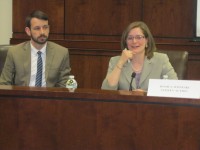State Legislators, Political Activists Seek Campaign Finance Reform

In an effort to increase the public’s participation in campaigns and decrease the influence of special interest groups and wealthy donors, a panel of local state legislators and political activitists proposed overhauling the state campaign finance system during a forum conducted on April 11 at the Greenburgh Town Hall.
During “Leveling the Playing Field: Campaign Finance Reform in New York State,” a panel discussion sponsored by Westchester for Change, reforms, including partial public financing for campaigns, were advocated by state Sen. Andrea Stewart Cousins (D-Yonkers), Assemblywoman Sandra Galef (D-Ossining), Ian Vandewalker, council for the Democracy Program at the Brennan Center at the New York University School of Law, and Jessica Wisneski, campaign director for Citizens Action of New York.

Wisneski told the roughly 40 residents in attendance that her organization is active on several issues in state government, including health care. Wisneski said her organization is among the groups and individuals seeking to create a system in which state funding would match small donations under a voluntary system, which is in place in Maine, Arizona, Connecticut and New York City. She said she hoped campaign finance reform legislation would become law in the current legislative session, which ends in June.
Vandewalker said his organization believes New York State should base campaign finance reform on the system that is used in New York City to “change the way Albany works.”
Vandewalker said New York City revamped its campaign finance system in the 1990’s and has made some modifications to it over the years. The city has a voluntary system in which taxpayer dollars match small donations of $250 or less by a ratio of $6 in city money for each $1 in small donations, he noted.
The New York City system has increased participation, diversity of candidates and donors and competition, Vandewalker said. According to the most recent statistics, 64 percent of donations to campaigns of city candidates who participated in the partial city funding system were $250 or less, he noted. Candidates who chose not to take part in the system had 66 percent of their donations in amounts of $1,000 or more, he said.
If the state were to enact a partially funded campaign finance system the cost would between $26 and $41 million annually, which would translate into no more than 0.036 percent of the $135.1 billion state budget, Vandewalker said. “It’s not a lot of money,” he said.
Wisneski said Gov. Andrew Cuomo and Assembly Speaker Sheldon Silver support campaign finance reform, but reforms have not been okayed in the state Senate.
Though Galef, who is a member of the state Assembly’s Election Law Committee, said she has been supporting campaign finance reform since first taking her seat in 1993. “It’s really a tough sell,” Galef said.
Money influences elected officials, Galef said. If you receive a large campaign donations from individuals “You are going to going to pay attention to them,” she said.
Despite the difficulty of getting campaign finance reform passage, “I just think it’s good for democracy,” Galef said.
Stewart-Cousins said measures must be taken in the state to reduce the amount of money a person must raise to be a viable political candidate. In her first race for the Westchester County Board of Legislators in 1995 Stewart-Cousins said she raised a total of $20,000 for her entire campaign. In her first state Senate run in 2004, Stewart-Cousins said she raised $150,000 in just the first half of the year.
Stewart-Cousins leads the Democratic caucus in the state Senate. While there are technically 33 Democrats in the 63-seate Senate, only 28 caucus with their party, while five other Democrats caucus with the Republicans in the chamber, she said. A package of “real reform,” will probably be attained if the five “Independent Democrats” vote for it, she said.
